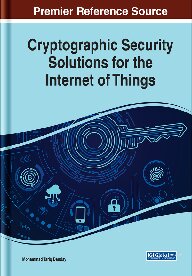

Most ebook files are in PDF format, so you can easily read them using various software such as Foxit Reader or directly on the Google Chrome browser.
Some ebook files are released by publishers in other formats such as .awz, .mobi, .epub, .fb2, etc. You may need to install specific software to read these formats on mobile/PC, such as Calibre.
Please read the tutorial at this link: https://ebookbell.com/faq
We offer FREE conversion to the popular formats you request; however, this may take some time. Therefore, right after payment, please email us, and we will try to provide the service as quickly as possible.
For some exceptional file formats or broken links (if any), please refrain from opening any disputes. Instead, email us first, and we will try to assist within a maximum of 6 hours.
EbookBell Team

0.0
0 reviews
ISBN 13: 9781522557425
Author: Mohammad Tariq Banday
The Internet of Things is a technological revolution that represents the future of computing and communications. Even though efforts have been made to standardize Internet of Things devices and how they communicate with the web, a uniform architecture is not followed. This inconsistency directly impacts and limits security standards that need to be put in place to secure the data being exchanged across networks. Cryptographic Security Solutions for the Internet of Things is an essential reference source that discusses novel designs and recent developments in cryptographic security control procedures to improve the efficiency of existing security mechanisms that can help in securing sensors, devices, networks, communication, and data in the Internet of Things. With discussions on cryptographic algorithms, encryption techniques, and authentication procedures, this book is ideally designed for managers, IT consultants, startup companies, ICT procurement managers, systems and network integrators, infrastructure service providers, students, researchers, and academic professionals.
Section 1: Introduction
Chapter 1: Security in Context of the Internet of Things
ABSTRACT
INTRODUCTION
TECHNOLOGIES ENABLING INTERNET OF THINGS
THREATS AND SECURITY
CRYPTOGRAPHY AND ITS APPLICATIONS IN THE INTERNET OF THINGS
CONCLUSION
REFERENCES
Section 2: Encryption and Cryptography
Chapter 2: Encryption Principles and Techniques for the Internet of Things
ABSTRACT
INTRODUCTION
BACKGROUND
LIGHTWEIGHT CRYPTOGRAPHY
BASIC OPERATIONS
ENCRYPTION TECHNIQUES FOR IOT
COMPARISON OF LIGHTWEIGHT CRYPTOGRAPHIC ALGORITHMS FOR IOT
CONCLUSION AND FUTURE DIRECTIONS
REFERENCES
KEY TERMS AND DEFINITIONS
Chapter 3: A Review of Cryptographic Algorithms for the Internet of Things
ABSTRACT
INTRODUCTION
BACKGROUND
IOT ARCHITECTURE
CRYPTOGRAPHIC ALGORITHMS FOR IOT
LIGHTWEIGHT CRYPTOGRAPHY ALGORITHMS
COMPARISON OF LIGHTWEIGHT CRYPTOGRAPHIC ALGORITHMS
CONCLUSION AND FUTURE WORK
REFERENCES
Section 3: Security Protocols
Chapter 4: Addressing Security Issues of the Internet of Things Using Physically Unclonable Functions
ABSTRACT
INTRODUCTION
PUF ATTRIBUTES AND METRICS
PUF CIRCUIT DESIGNS
GENERATION OF PUF RESPONSES
VULNERABILITY ANALYSIS IN PUFs: CHALLENGES AND OPPORTUNITIES
PUF-ENHANCED CRYPTOGRAPHY
CONCLUSION
REFERENCES
Chapter 5: Hardware Primitives-Based Security Protocols for the Internet of Things
ABSTRACT
INTRODUCTION
INTRODUCTION TO PUFs
PUF BASED SECURITY PROTOCOLS FOR THE IOT
SECURITY ANALYSIS AND DISCUSSION
CONCLUSION
REFERENCES
Chapter 6: Secure Computation of Private Set Intersection Cardinality With Linear Complexity
ABSTRACT
INTRODUCTION
BACKGROUND
RELATED WORKS
ONE-WAY PSI-CA AND APSI-CA PROTOCOLS
MPSI-CA PROTOCOL
CONCLUSION
REFERENCES
Chapter 7: A Secure Gateway Discovery Protocol Using Elliptic Curve Cryptography for Internet-Integrated MANET
ABSTRACT
INTRODUCTION
ARITHMETIC BACKGROUND OF ECC
LITERATURE REVIEW
MOTIVATION FOR RESEARCH
PROPOSED SECURITY PROTOCOL
SECURITY ANALYSIS OF PROPOSED PROTOCOL
PERFORMANCE EVALUATION BASED ON COMPUTATIONAL TIME
CONCLUSION AND FUTURE SCOPE
REFERENCES
Chapter 8: Preserving Security of Mobile Anchors Against Physical Layer Attacks
ABSTRACT
INTRODUCTION
RELATED WORKS
SECURITY ISSUES IN WIRELESS SENSOR NETWORKS
PROPOSED SECURITY MODEL PERSPECTIVES
PERFORMANCE EVALUATION FRAMEWORK
CONCLUSION
REFERENCES
Chapter 9: An Adaptive Security Framework for the Internet of Things Applications Based on the Contextual Information
ABSTRACT
INTRODUCTION
BACKGROUND
ADAPTIVE SECURITY FRAMEWORK USING CONTEXT
EXPERIMENTAL EVALUATION
CONCLUSION
REFERENCES
Section 4: Social/Legal Issues and Forensics
Chapter 10: Emerging Social and Legal Issues of the Internet of Things
ABSTRACT
THE ‘INTERNET OF THINGS’ MODEL
IoT FRAMEWORK WITHIN REGULATION (EU) 2016/679
COMPARISON OF THE ANONYMIZATION PROCESS OF USA: EUROPE
TOWARDS PII 2.0
THE ’NOTICE AND CONSENT’ MODEL IN SAFEGUARDING THE CONSUMER
POSSIBLE DEVELOPMENTS: TOWARDS AN OPT-OUT SCHEME
CONCLUSION
REFERENCES
KEY TERMS AND DEFINITIONS
Chapter 11: Digital Forensics in the Context of the Internet of Things
ABSTRACT
INTRODUCTION
LITERATURE SURVEY AND RELATED WORK
DIGITAL FORENSICS AND IOT
IOT FORENSICS
ROLE OF IOT IN DIGITAL FORENSICS
VARIATION OF IOT FORENSICS FROM TRADITIONAL DIGITAL FORENSICS
IOT FORENSICS AT DIFFERENT LAYERS
DIGITAL EVIDENCE IN IOT FORENSICS
REQUIREMENTS OF FUTURE GENERATIONS OF IOT SYSTEMS
CONCLUSION
ACKNOWLEDGMENT
REFERENCES
what is cryptographic security
cryptographicbased security systems
cryptographic service providers
cryptographic solutions technical advisory group
cryptographic security clearance